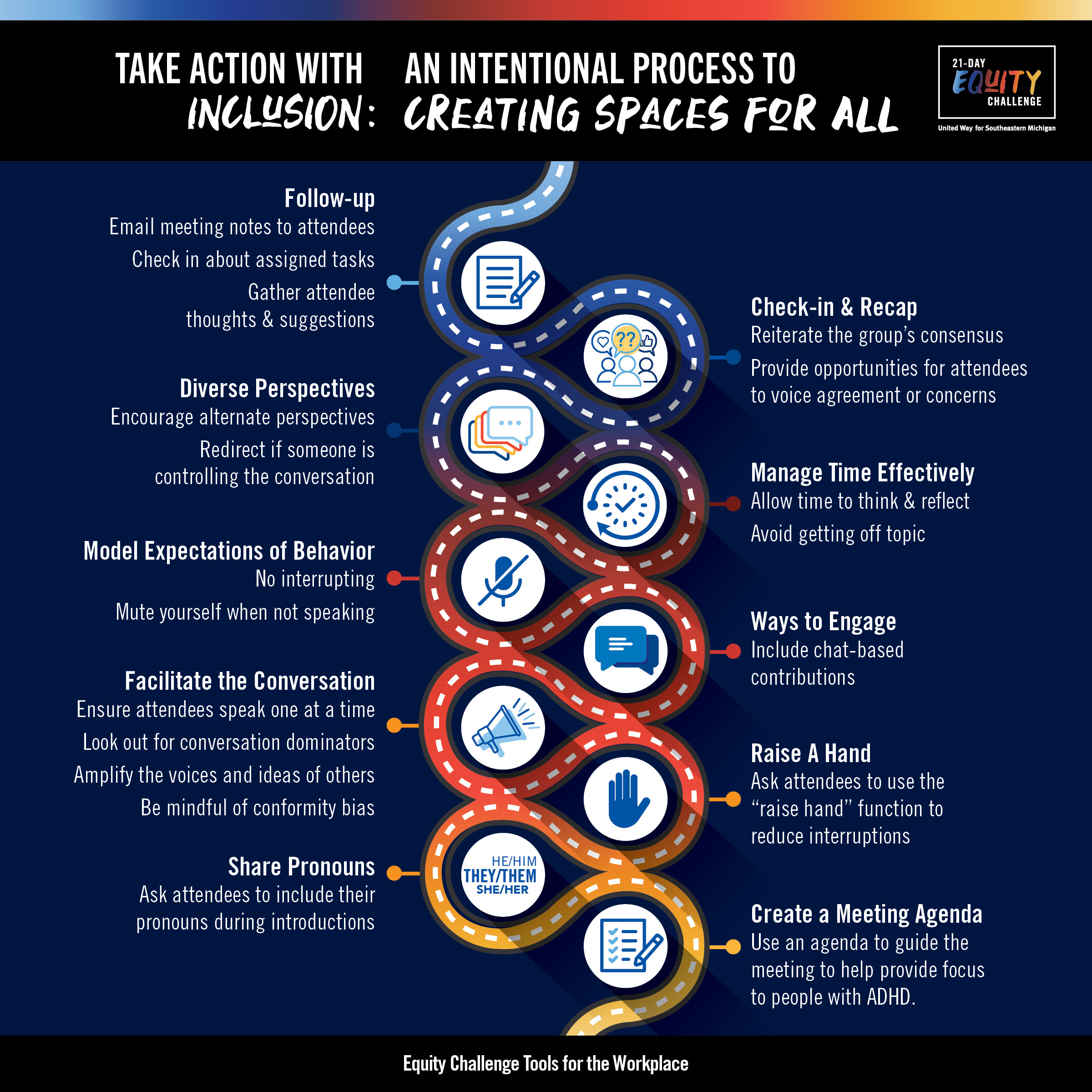Over the last 21 days, we have learned how inequities permeate our communities on individual, institutional and systemic levels. As we conclude our 2024 Equity Challenge, we encourage you to reflect on what you have learned and what role you can take in making the communities you are part of (your home, family, school, neighborhood, religious groups, etc.) more equitable for all. As we collectively work to transform systems and structures, we can also employ strategies that support our neighbors, colleagues and friends individually to make them feel welcome and celebrate their full, authentic selves.
So, how do we do this? With inclusion. Inclusion is a value and practice of ensuring that people feel they belong and that their input is valued by the whole (group, organization, society, system, etc.), particularly regarding decisions that affect their lives. This practice should include authentically bringing traditionally excluded individuals and/or groups into processes, activities and decision/policymaking in a way that shares power to ensure that their needs are considered. Inclusive spaces are those that foster a sense of belonging, respect and dignity for everyone. Inclusion means, “I built this with you in mind. Let’s continue to build it together.”
Why do inclusive spaces matter? Research has shown that inclusive spaces lead to better outcomes, increased creativity, higher job satisfaction and a stronger sense of belonging.
- Inclusive communities have been found to lead to improved physical and mental health outcomes. According to a study by the Robert Wood Johnson Foundation, people who live in socially cohesive communities are more likely to be healthy and live longer than those who live in socially isolated communities.
- According to a study by Deloitte, organizations that prioritize diversity and inclusion in the workplace are more innovative and more likely to have high employee engagement levels. Additionally, inclusive teams outperform their peers by 80% in team-based assessments.
- Inclusive school environments have been found to improve academic outcomes for all students. According to a study by the National Center for Education Statistics, students in inclusive classrooms made greater progress in reading and math than students in non-inclusive classrooms.
- Inclusive sports teams have led to increased participation and enjoyment for all players. According to a study by the University of Alberta, inclusive sports teams that welcome players of all abilities have been found to be more enjoyable and rewarding for all players, regardless of their level of ability.
- Inclusive religious spaces have been found to improve mental health outcomes for members of marginalized communities. According to a study by the Journal of Muslim Mental Health, inclusive religious spaces can help reduce feelings of social isolation and improve mental health outcomes for Muslims who experience discrimination and marginalization.

Where do we go from here? As our challenge ends for 2024, we invite you to join us in the journey ahead. Our commitment to equity doesn’t end with these 21 days; in many ways, this is when the real work begins. What from the challenge will you take with you? What actions will you start taking in your community? Today’s resources focus on actions we can take to build more inclusive spaces that lead to a stronger community for all.
Today's Challenge
Read
- Check out this Inclusive Meeting Guide with steps you can take today. (5 minutes)
- Check-in questions and icebreakers are a great strategy to build inclusion. Learn why and how you can add these to your spaces. (10 minutes)
- Do you work in Human Resources at your organization? You may find these five ways to create an inclusive work culture helpful! (7 minutes)
- Learn strategies from the Positive Coaching Alliance to create welcoming and inclusive spaces in sports for LGBTQ Youth. (10 minutes)
Watch
- Use these strategies to create inclusive work meetings. (3 minutes)
- Watch Microsoft’s animated guide to inclusive design. (4 minutes)
Act
- When setting up event spaces, there are many factors to incorporate to build an inclusive and accessible event that welcomes all people. Commit to learning about inclusive event spaces and select items from Detroit Disability Power‘s toolkit and The University of Michigan’s Accessible Event Checklist and Hosting Accessible Remote Events guide to incorporate in your next in-person or remote event, meeting or gathering.
- Take our post-Equity Challenge Survey to help us understand your learnings and next steps.
- Join us for our virtual Community Closing Event today at noon to honor our collective journey and celebrate our achievements over the past 21 days.
Reflect And Share
- What have you learned from your experience with the Equity Challenge?
- How will you work to create inclusive spaces? Who are the people that could work with you to create inclusive spaces?
- Revisit today’s quote “Inclusion is not a strategy to help people fit into the systems and structures which exist in our societies; it is about transforming those systems and structures to make it better for everyone.” In what ways does this show up in your life? How does it relate to other Equity Challenge topics?
- How will you stay committed throughout the entire year? What actions can you take?
- Share your reflections from the final week of the challenge on our virtual Word Cloud.